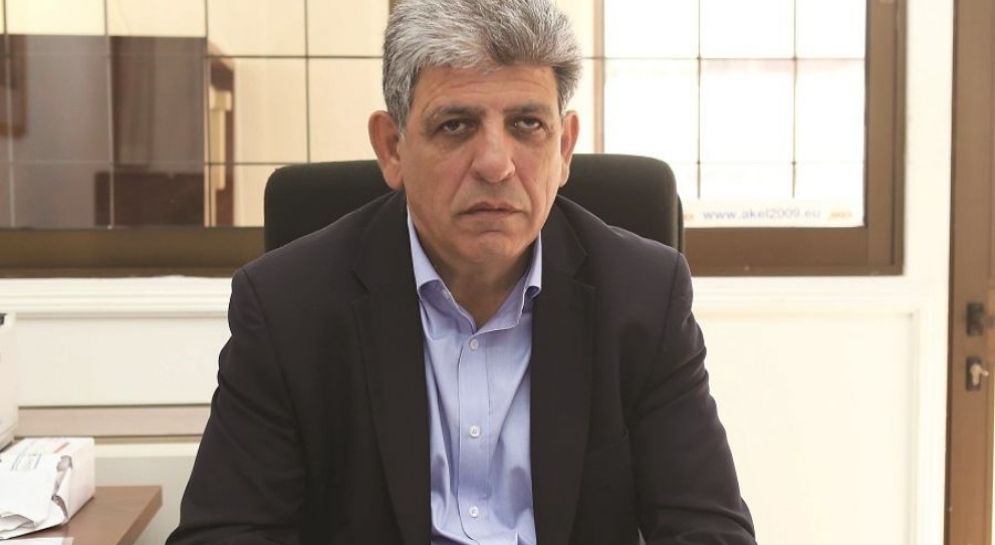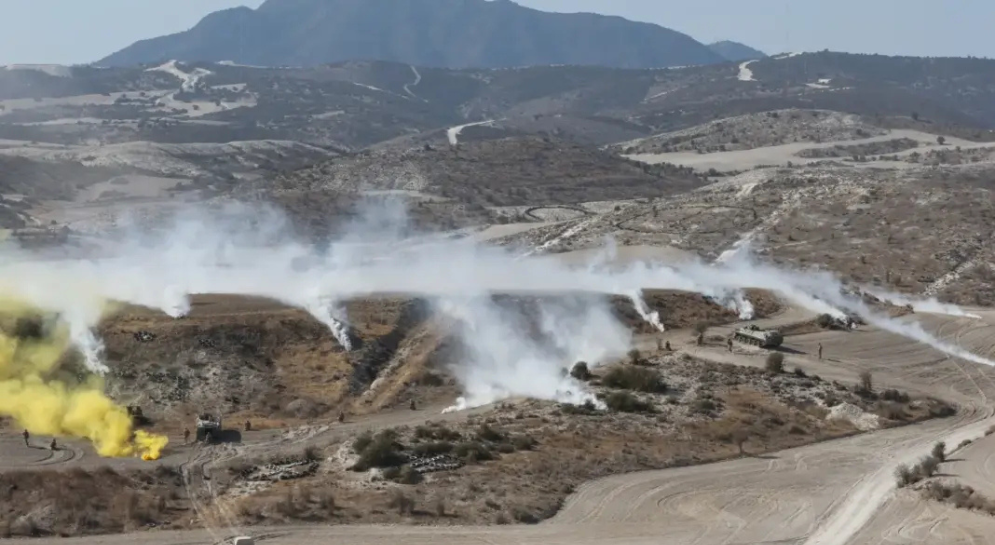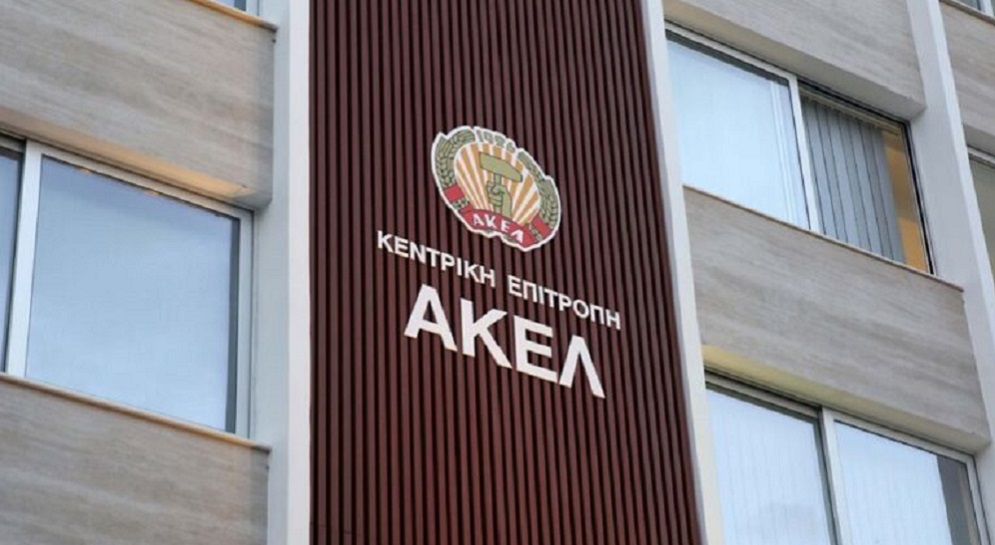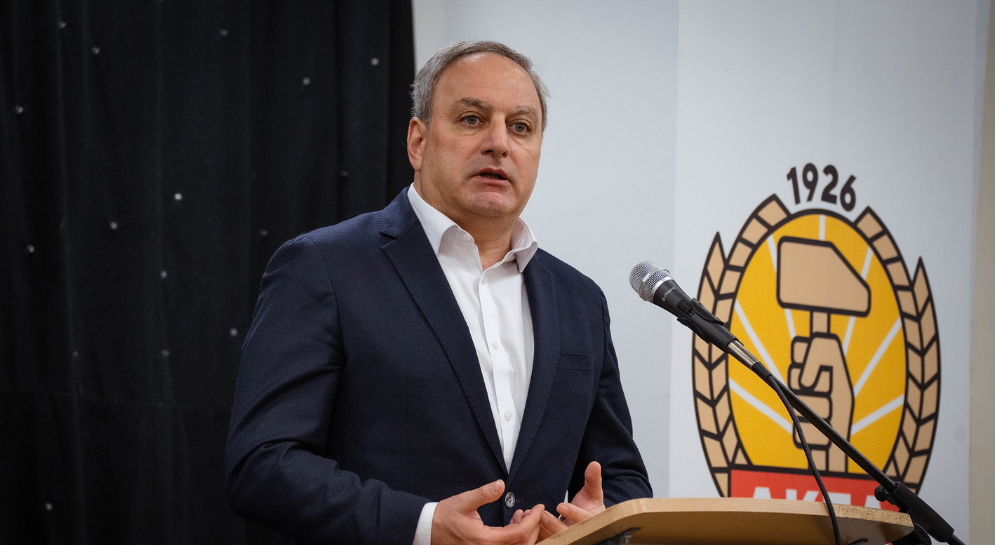
Interview with Neoklis Sylikiotis, AKEL Political Bureau member
Sunday 5th April 2021 ‘Politis’ daily newspaper
- In the 30th May elections we say: Enough!
- The finalization of partition will accumulate new troubles for Greek Cypriots and Turkish Cypriots. We must make use of the opportunities and circumstances that are increasingly being limited to reach a solution of the Cyprus problem.
- Cyprus can and must develop into a bridge of peace and cooperation in the Eastern Mediterranean region
What exactly is the Cyprus problem today?
NS: The Cyprus problem is an international problem, a problem of foreign interventions, invasion and occupation. This all stems from Cyprus’ geostrategic position in the centre of the Eastern Mediterranean, where in recent years large deposits of energy sources have been discovered. At the same time the Cyprus problem also has an internal aspect, namely the restoration of the relations between the two communities.
Our country is very close to one of world’s most volatile regions, where powerful geostrategic interests are clashing, as well as the interests of regional powers such as Turkey, Saudi Arabia and Israel, all countries seeking regional supremacy. At the same time, the discovery of significant natural gas deposits in the Exclusive Economic Zone (EEZ) of the Republic of Cyprus, as well as in the EEZ of neighboring countries are creating more complications with regards the energy interests of big countries and large oil conglomerates.
‘The President hasn’t responded to AKEL’s proposal’
What moves must the Greek Cypriot side and President Anastasiades make to convince that they mean what they say about seeking a solution of the Cyprus problem on the basis of bizonal, bicommunal federation with political equality?
NS: At the beginning of last December, AKEL had submitted a proposal to President Anastasiades on the Cyprus problem that aimed, through specific moves we had highlighted, to convince of the Greek Cypriot side’s good intentions.
AKEL’s proposal focuses on two axes. First, the Greek Cypriot side must declare that it adheres without putting forth terms and preconditions to the agreed framework of the solution, namely bi-zonal, bicommunal federation, with political equality as set out in the relevant Resolutions of the UN. It should also express its readiness to continue the negotiations on the basis of the 2014 Joint Declaration, the Guterres Framework and the convergences that have been recorded so far, including the proposal for a rotating presidency with a cross and weighted vote and a single Turkish Cypriot vote in the decisions of the Ministerial Council.
The second axis of our proposal concerned natural gas and maritime zones. AKEL considers that the Greek Cypriot side should reaffirm the Christofias – Talat convergences which stipulate that maritime zones and natural resources will constitute a federal competence, as well as the convergence recorded on the sharing/allocation of federal revenues.
Furthermore, AKEL proposes that with the conclusion of the talks in a strategic understanding, the Turkish Cypriots should be involved in the natural gas issues. With the solution of the Cyprus problem, the Greek Cypriot side should express its readiness to establish a Federal Hydrocarbon Fund, start negotiations with the aim of delimiting the Cyprus-Turkey EEZ and conclude a mutually beneficial agreement on the route of a natural gas pipeline, provided that this would be convenient in economical and technical terms. Unfortunately, we haven’t had any response to our proposal from President Anastasiades.
The President’s regressions
Do you agree with President Anastasiades’ recent statement that we have accepted political equality? Or that can we still negotiate it with a give-and-take exchange as the DISY President has said?
NS: The Greek Cypriot side has accepted political equality as set out in the UN Security Council resolutions in 1992. At the same time, through the negotiations over the years, significant progress has been recorded with regards the effective participation of the Turkish Cypriots in the decision-making which is expressed through political equality. Indeed in the UN Secretary General’s report submitted in September 2017 he noted that the issue of effective participation at the end of the conference at Crans Montana was in effect resolved.
Unfortunately, we had regressions on the part of President Anastasiades on the one positive Turkish Cypriot vote in the Council of Ministers, which he wants to confine to just the issues affecting the Turkish Cypriot community.
These positions, together with the “new realism” position advocated by DISY Deputy Chairman Haris Georgiades, that he neither accepts nor rejects political equality, not only represent a setback in terms of what has already been agreed, but also offers Turkey and the Turkish Cypriot leadership the opportunity to put the two state solution and its position for sovereign equality, which leads to confederal structures, on the negotiating table.
Forces supporting the solution
Are there sufficient forces today both in the north and in the south to support a solution and an agreement on the Cyprus problem in the event this is achieved in the near future?
NS: Yes, these forces do exist in both communities. Within the Greek Cypriot community, the desire for a solution and reunification on the basis of bizonal, bicommunal federation with political equality is supported by the majority of the people and political forces. Within the Turkish Cypriot community, the will for a solution and reunification is expressed by the majority of Turkish Cypriots, despite the alteration of their will through the interventions of Turkey and the settlers in the recent vote for the assumption of their community’s leadership. The genuine will of the Turkish Cypriots is conveyed through the firm positions expressed and mobilizations of the majority of the Turkish Cypriot political forces, trade unions and civil society.
Are you annoyed by references like “the government in the south” or are they expected from movements that question the status quo?
NS: This reference to the occupation conditions is incorrect. Supporting the entity and legality of the Republic of Cyprus constitutes an important weapon in our struggle to prevent our country’s final partition. However, the ruling DISY party’s hypocrisy, of those who refuse to hold the flag of the Republic of Cyprus and who flirt or provide cover to those who are flirting behind the people’s backs for a two-state solution to accuse others of lacking in patriotism, is astonishing.
Outrage, reaction
What is the “Enough” platform/movement about? Is its emergence and activity useful?
NS: Civil society’s reaction is a result of the policies being implemented by the Anastasiades-DISY government that has led to dramatic deadlocks, institutional corruption and entanglement/interwoven interests, authoritarianism and the curbing of Democracy. The “Enough” platform, composed of dozens of movements and hundreds of citizens, expresses this anger felt by a big majority of society towards the policies and practices of the Anastasiades-DISY government.
Is this political platform connected to AKEL?
NS: AKEL supports and defends the inalienable right of citizens to express their views, to protest and demonstrate in support of their positions. This is what democracy demands. The platform has a coordinating body and representatives. It has no organizational or other political relationship whatsoever with AKEL. Of course, as active citizens, members, friends and supporters of our Party, participate in numerous social movements and organizations, and this is also the case with the mobilizations organised by the platform.
The correct thing would be to transfer this anger and these demands from the streets to the ballot box on the 30th May parliamentary elections to send out a powerful message to the Anastasiades-DISY government about the corruption, authoritarianism and the dramatic deadlocks they have led our country to on every level.
Pluralistic or monolithic?
Why isn’t AKEL a pluralistic party? It is monolithic… Why can’t it accept the fluctuations/shades of the Left and rejects them?
NS: In AKEL all its members and militants participate actively in decisions and discussions, expressing their views openly. Of course there is a pluralism in the views, positions and proposals expressed. On the approval of decisions taken collectively, all members consciously participate in their realisation in practice. That’s how a party in a collective way can be effective, otherwise we will end up with makeshift positions and views, without any beginning and an end, leading to the party’s inaction and inefficiency.
My experience from AKEL’s participation in the Group of the European United Left in the European Parliament shows that the joint action of communist, socialist, ecological, left-patriotic, progressive, animal-friendly parties and movements can bring results. The joint action of the pluralist Left is the only way to resist neoliberalism and assert progressive change. This is the path AKEL pursues in Cyprus, through the promotion of joint action and cooperation with movements and organizations of the broader Left and ecological movement.
Why doesn’t AKEL manage to capitalize on the people’s dissatisfaction with the government?
NS: The general depreciation and destructive levelling of political forces by the government and the majority of the mass media inevitably affects AKEL as well. Populist forces/figures are promoted and rewarded especially in today’s conditions and not those who support political positions with consistency and express a coherent political discourse.




